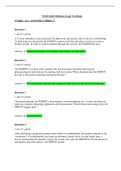-
1. College aantekeningen - Identity politics: pride (sexuality) - sociology - making sense of society (seminar 5...
-
2. College aantekeningen - Society under lockdown & health inequality - sociology - making sense of society (sem...
-
3. College aantekeningen - Voter participation & report guidance - sociology - making sense of society (seminar ...
-
4. College aantekeningen - Environment/capitalism/communism/business/patenting/gm food - sociology - making sens...
-
5. College aantekeningen - Community and social capital - sociology - making sense of society (seminar 9)
-
6. College aantekeningen - Activism & transformative sociology - sociology - making sense of society (seminar 10...
-
7. College aantekeningen - Reading reports: global report on trafficking in persons 2018 - sociology - becoming ...
-
8. College aantekeningen - Focus groups - sociology - becoming a sociologist (seminar 6)
-
9. College aantekeningen - Quantitative methods vs qualitative methods - sociology - becoming a sociologist (sem...
-
10. College aantekeningen - Task recap/module review of becoming a sociologist - sociology (seminar 10)
-
11. College aantekeningen - Sociology and everyday life - introduction & module overview (week 1)
-
12. College aantekeningen - What is everyday life? sociology and everyday life (week 2)
-
13. College aantekeningen - Presentation skills, making love in the supermarkets, making sense of everyday life -...
-
14. College aantekeningen - Symbolic interactionism - sociology and everyday life (week 4)
-
15. College aantekeningen - Erving goffman: the present of self in everyday life - sociology and everyday life (w...
-
16. College aantekeningen - Teams and regional behaviour erving goffman – &opencurlyquote;the presentation of self in everyd...
-
17. College aantekeningen - Erving goffman: presentation of self in everyday life/stigma - sociology of everyday ...
-
18. College aantekeningen - Erving goffman – stigma (notes on identity) - sociology and everyday life (week 8)
-
19. College aantekeningen - Erving goffman – stigma (personal identity) - sociology and everyday life (week 9)
-
20. College aantekeningen - Erving goffman, stigma & moral career/stigma – ego identity - sociology and everyda...
-
21. College aantekeningen - Introduction to poverty in the uk - practicing sociology (week 1)
-
22. College aantekeningen - Politicising poverty - practicing sociology (week 2)
-
23. College aantekeningen - Report writing and assessment guidance - practicing sociology (week 3)
-
24. College aantekeningen - Sociology and social policy - practicing sociology (week 4)
-
25. College aantekeningen - Theorising new poverty: zygmunt bauman - practicing sociology (week 5)
-
26. College aantekeningen - Representation of poverty in the news - practicing sociology (week 6)
-
27. College aantekeningen - Visual sociology and ethics - practicing sociology (week 7)
-
28. College aantekeningen - General attitude towards poverty in the uk - practicing sociology (week 8)
-
29. College aantekeningen - Literature review - practicing sociology (week 9)
-
30. College aantekeningen - Debating the causes of poverty - practicing sociology (week 10)
-
31. College aantekeningen - Understanding social change - lecture notes 1, 2 and 3 (introducing theory, karl marx...
-
32. College aantekeningen - Introducing sociological theory - understanding social change (seminar 1)
-
33. College aantekeningen - Capitalism, communism, karl marx, false consciousness - understanding social change (...
-
34. College aantekeningen - Du bois - understanding social change (seminar 3)
-
35. College aantekeningen - Durkheim - understanding social change (seminar 4)
-
36. College aantekeningen - Georg simmel - understanding social change (seminar 5)
-
37. College aantekeningen - Max weber - understanding social change (seminar 6)
-
38. College aantekeningen - Michel foucault - understanding social change (seminar 7)
-
39. College aantekeningen - Feminism - understanding social change (seminar 8)
-
40. College aantekeningen - Anthony giddens - understanding social change (seminar 9)
-
41. College aantekeningen - Introduction to society and justice: gender, class, race and ethnicity - sociology an...
-
42. College aantekeningen - Society and justice: gender - sociology and criminology (week 2 lecture and seminar n...
-
43. College aantekeningen - Society and justice: class - sociology and criminology (week 3 lecture and seminar no...
-
44. College aantekeningen - Society and justice: race and ethnicity - sociology and criminology (week 4 lecture a...
-
Meer zien





